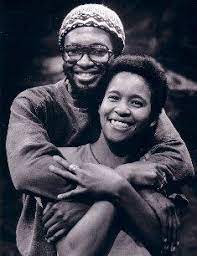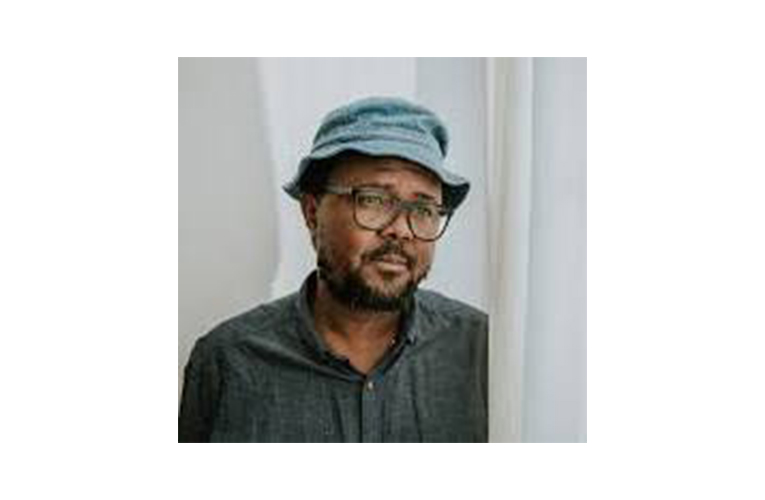Late thinker and artist Matsemela Manaka in focus as symposium reflects on his seminal book Echoes of African Art: A Century of Art in South Africa
By Edward Tsumele, CITYLIFE/ARTS Editor
It is a book that hounded art historian and academy Thembinkosi Goniwe for quite a long time, particularly during the Covid-19 period. He felt that something must be done about the man, Matsemela Manaka. After all, he wore several hats in the South African art contempo0rary art practice – a poet, playwright and painter. And yet in what perhaps young poet Kholeka Putuma refers to as collective amnesia her in a poem contained in the book by the same title, Manaka today is a forgotten man. Banished into the dustbin of our fractured art history where celebrity status is valued over talent. Yet he is the man whose time, if one may add, was just ahead of society’s.
Perhaps today, in reflection, one must forgive many men and women, particularly from Diepkloof in Soweto, who proudly and perhaps sometimes a bit loudly, claim either to have been mentored or, influenced by Manaka’s ideas in general and his art practice in particular – as a poet, playwright and painter. Indeed a number of them were touched by his multi-faceted art practice. Today among some of them, one can discern Manaka’s influence steeped in the Black Conscious tradition. Such was the man’s standing and status in society. He shaped the lives and thinking of a generation of black thinkers in the sprawling township of Soweto and beyond.
It therefore makes great sense that contemporary thinkers and intellectuals such as Goniwe and his collaborators at Bag Factory Artist Studios in Fordsburg and Umhlabathi Collective in Newtown, are digging back into the rich intellectual and artistic archives left behind by Manaka, not only to recognize his contribution into South African, and ultimately African black art history, but to make us all pose and think the following: how come such a man, clearly ahead of his time, who influenced and shaped the thinking and art practice of many people –including community activists, writers, painters, poets, thespians and one does not know whoever else, is in a free country not as celebrated as he should be. Why do we not have even a steer in Newtown named after him along side such deserving names as Helen Joseph, Mahlathini, Miriam Makeba, Gugu Mrwebi etc?” Why has he not even been posthumously been conferred an honorary doctorate by the country’s leading universities for his contribution to the struggle with such powerful plays such as Egoli, his poetic works, his paintings and most importantly his community involvement through for example his establishment of the Soyikwa Institute?
“It really is up to us contemporary art practitioners, thinkers and art historians to assemble Manaka’s rich artistic archive and bring it to the fore so that those that have the powers to honour him can see what he has done,” Goniwe Told CITYLIFE/Arts in an interview ahead of an important symposium taking place at Bag Factory on Friday, February 9, 2024 and Umhlabathi on Saturday, February 10. 2024.
Conceptualised by Goniwe and hosted by The Bag Factory Artist Studios and UMhlabathi, where panels are discussing Manaka and his art practice, this in a way, is a step in the right direction to in a way reverse the collective amnesia that that Putuma refers to in her poetry. However this symposium focuses on Manaka’s book that he published in 1987, whose extracts are on exhibition at Umhlabathi. It was a curatorial choice Goniwe had to make out of Manaka’s wide spectrum of artistic practice that spanned poetry, stage-play directing and painting among other artistic pursuits.

“I chose to highlight and focus on the book, Echoes of African Art: A Century of Art in South Africa. I hope that ideas will emerge out of this symposium with thinkers coming out with ideas about the way forward with regards to Manaka’s life. I am open to ideas,” he states.
And might be interesting to note that Manaka by publishing this book on black art history, propels him into the a prestigious, but tiny circle of black writers who have bothered to write about black artist and their art practice in South Africa, for example Professor Chabani Manganye, the renowned clinical psychologist who wrote the biography of Gerard Sekoto. There has since been a dearth of black writers in South Africa who have written on black artists, with the exception of Goniwe whose passion for writing about black artists in recent years is somehow, a welcome and refreshing approaching to reflecting on the lives of black artists by a black art historian. He has for example written on the life and art practice of the late legendary artist David Koloane, and has also published a book on photographer Andrew Tshabangu.
“The reality is writing is not seen as a lucrative endeavour. It is mostly lo9nely and does not get one artist star status, such as when one is a successful practicing artist or curator. And also there traditionally are few role models who writers who have published books on black artists and their art practice. There is also that issue of black people coming from a non privileged background in which case there is pressure to pursue commercial viable activity in order to take care of the extended family. But however that is no excuse for black writers not to write about black artist and their art practice,” Goniwe reflects while looking forward to the symposium that got financial support from the National Arts Council via The Bag Factory
”The Bag Factory is pleased to present Listening To The Echoes of Matsemela Manaka, a two-day symposium and exhibition opening, hosted by the Bag Factory and Umhlabathi Collective, Listening to the Echoes of Matsemela Manakais a programme which assembles different perspectives and reflections to revisit and celebrate the work and contribution of Manaka’s seminal 1987 publication, Echoes of African Art: A Century of Art in South Africa. Manaka was a dynamic figure: a painter, poet, playwright, educator and stage director whose creative output was dedicated to the shaping of South African culture and Black artistic dignity.
The symposium and parallel programme centres on the book, Echoes of African Art, as the only example that focuses on the history of South African art and black artists written by a black author. Keeping in mind that memory is our heritage, this symposium is aimed at keeping the heritage of Black artists alive, while further advancing their contributions to future generations of artists. Over two days, invited artists and scholars will ruminate on the legacy of the publication and its contribution to contemporary South African Art History.”
When Manaka died in 1998, he was not only mourned by South Africans, but the mourning found echoes globally, for he had taken shows to Europe and the US, where there were critically acclaimed, especially as they reflected on the lived black experiences in South Africa under apartheid.
For example academic Geoffrey V Davis had this to say in the Mail &Guardian:
“The death of Matsemela Manaka last Saturday deprives the South African theatre community of one of its foremost practitioners at a tragically early age. His many friends and collaborators overseas will join in mourning the loss of an artist whose remarkable career was distinguished by a delight in experimentation and innovation fuelled not least by his extraordinary talents as playwright and performer, painter and musician.”
Hopefully this symposium will ultimately result in the long awaited recognition by the powers that be of one of this country’s foremost intellectuals and foresighted artists Manaka.











I truly concure with the author that his work was remarkable.He immensely contributed into the art industry. He was a scholar too. I fully agree that a honorary Doctoral by an institution would wipe our tears.